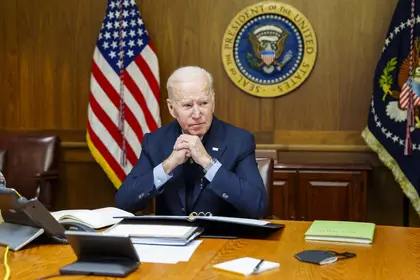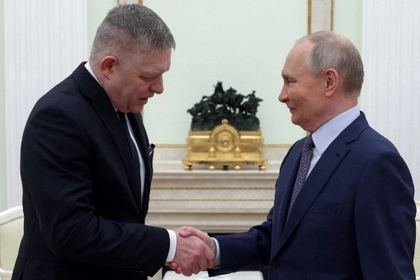It’s quiet in Moscow. Too quiet. Especially in the humiliating aftermath of Kyiv’s deadly missile strike against the Kremlin’s Black Sea headquarters in the Russian-occupied port of Sevastopol in Crimea last Friday. Thus far, the response has been largely muted – especially from Russian President Vladimir Putin’s favored propagandists.
JOIN US ON TELEGRAM
Follow our coverage of the war on the @Kyivpost_official.
Missing in action is the usual cavalcade of nuclear bluster and bravado emanating from Moscow’s broadcast studios. No calls to nuke London as punishment over use of the United Kingdom supplied Storm Shadows. Nary a schoolyard threat to march west all the way to Lisbon.
It begs the question – why?
Reality may be setting in across Moscow that Russia is losing the war, and its sons are dying in vain by the hundreds of thousands in Ukraine; or perhaps, we are witnessing the calm before Putin’s coming storm and the Kremlin has ordered the equivalent of “radio silence.”
Either way, we are likely coming down to a test of wills as we now enter the 20th month of this war. Ukrainian President Volodymyr Zelensky and his generals have repeatedly demonstrated their mettle and determination to win. Now, however, the war in Ukraine is effectively coming down to whether Putin’s will to survive is greater than US President Joe Biden’s willingness to win.
We are at a critical inflection point. As Ben Hodges, the retired commanding general of United States Army Europe, has repeatedly noted, Ukraine’s ultimate battlefield success or failure is going to hinge upon a test of “logistics and will.”

Can Putin Really Keep Russia’s Bases in Syria?
A weakened Putin is down for the count and the win is there to be had if only Biden can find the steadfast resolve to close this war out. Russia is not only reeling on the battlefields in Ukraine, but regionally and globally as well – and unfolding events in Nagorno-Karabakh in the southern Caucasus is indicative of this.
The timing of Azerbaijani President Ilham Aliyev’s decision to militarily intervene in his country’s breakaway province of Nagorno-Karabakh is significant. It only came about because of Russia’s growing weakness in Ukraine, and as a result, it was the first major external domino to fall in Putin’s collapsing would-be Peter the Great-like empire.
Nagorno-Karabakh is principally ethnically Armenian and is backed by neighboring Armenia’s Prime Minister Nikol Pashinyan. Armenia, in turn, is a member of the Collective Security Treaty Organization (CSTO), Putin’s watered-down version of NATO, and yet Moscow – faced with a fait accompli – sided with non-CSTO member Baku despite Azerbaijani troops killing Russian peacekeepers during their incursion.
Despite the provisions of Article 4 in the CSTO charter, Russian Foreign Minister Sergey Lavrov more or less told Pashinyan, “not our problem, you’re on your own.” Another one-way security agreement with the Kremlin.
Pashinyan directing his anger toward the Kremlin, said in response, “The recent attacks on Armenia by Azerbaijan allow us to draw an obvious conclusion that the external security systems in which we are involved are not effective from the point of view of state interests and the country's security.” Moscow is blaming Yerevan, as was made clear by when Lavrov declared, “unfortunately, the leadership of Armenia from time to time adds fuel to the fire itself.”
Armenia is now confronted with potentially upwards of 120,000 ethnic Armenian refugees fleeing Nagorno-Karabakh out of a fear of “ethnic genocide.” As a consequence, Yerevan will likely continue down its path of pivoting toward the West and the European Union. In its wake, Putin’s hapless CSTO is on life support, if not effectively already dead – and a bad precedent to send to the remaining signatories. Blood in the water – Georgia and Moldova have picked up on the scent as well.
Nonetheless, Putin’s undaunted will to continue fighting in Ukraine remains, even though Russia is continuing to lose the test of logistics. In desperation, Moscow has turned to its “Arsenals of Evil” in seeking drones from Iran and 152mm artillery shells from North Korea to replenish his badly depleted stores. According to Bloomberg, “Russia intends to allocate 10.8 trillion rubles ($112 billion) to military needs next year, a jump by two-thirds compared with 2023,” which will account for 6 percent of their gross domestic product (GDP).
Putin’s will, however, is now facing an even greater military challenge on the ground in Ukraine. The ISW now assesses that “Ukrainian forces have broken through Russian field fortifications west of Verbove in the western Zaporizhzhia Region.” Further, ISW notes “that Russia does not have sufficient forces deployed to this sector to completely man its defenses in depth and that Ukrainian forces should be able to operate through Russian field fortifications more rapidly if they are not properly manned.”
Ukraine also continues its multi-domain operations (MDO) condition setting in the Crimean Peninsula itself. In a series of highly successful multi-layered strikes designed to peel back the Kremlin’s defenses in Crimea, Kyiv has destroyed Russian radar systems on nearby recaptured Black Sea oil rigs, multiple S-400 surface-to-air defense batteries, and repeatedly targeted Russian air bases, including most recently near occupied Saki, “on Ukraine’s western coast.”
Combined, the strikes also helped set conditions for the “wrecking” of the Russian cruise missile Rostov-on-Don submarine and the landing ship Minsk earlier this month in Sevastopol – and culminating, at least for now, in the destruction of Putin’s Black Sea naval headquarters.
A blow to Putin’s psyche perhaps, as the Kyiv Post’s Chris York posited, made even deadlier by an earlier missile strike on the “secret Russian Command Post in Crimea,” potentially forcing the Kremlin’s military leadership back to the now destroyed HQ.
Nor are Russian setbacks limited to the Zaporizhzhia Region and Crimean Peninsula. Ukraine also recaptured Andriivka in the Donbas, a key now-destroyed city in its efforts to retake Bakhmut and the surrounding area along that axis of the war.
Putin, given the growing number of displaced Jenga pieces threatening both his “special military operation” in Ukraine and the very survival of his regime hanging in the balance, desperately needs a gamechanger – and he needs it fast. The necessity of the same makes Putin’s muted response thus far to the kinetic and symbolic attack on his navy HQ all the more disconcerting.
He likely needs to go big or go home as the ubiquitous saying goes. Putin likely tried that in his meeting with North Korean Supreme Leader Kim Jong-un during their meeting at the Vostochny Cosmodrome when he appeared to attempt to play a nuclear wildcard against the West in the Pacific, if not outer space itself.
Biden, likewise, needs a game changer. A winning shot. Now that the “Kabuki theater” of the opening of the 78th General Assembly session is over – as we characterized it during an interview on TVP World in Warsaw, Poland – Biden and his administration must find the willingness to go for the win and put Putin down for the count. While welcomed, more air defense systems are not the answer; rather, precision deep strike capability, HIMARS delivered cluster munitions to destroy ‘third line defensive positions,’ fighter aircraft to establish air superiority, and engineering assets to breach minefields.
Putin will not stay muted for long. Whether he can pull it off or not, the Kremlin is likely preparing for another massive bombardment of Kyiv – and its symbolic places of government and culture.
One of Putin’s propagandists, Julia Vityazeva, hinted as much. Julia Davis, the Russian media expert and Daily Beast and CEPA columnist, noted Vityazeva “said she is at peace, knowing that Kyiv, Odesa and other Ukrainian cities will lay in ruins.” Conceivably, a worst-case scenario would involve an “accident” at the Zaporizhzhia Nuclear Power Plant.
Hodges is right. War is a test of logistics and will – and Biden is now facing his conventional Harry S. Truman World War II-like moment – will he enable Ukraine to win the war? Half-measures will not produce a winning result. Nor will prevaricating over ATACMS. As many of America’s senior retired generals are urging, Biden must deliver ATACMS in all of its variants, not just equipped with shorter range cluster munitions as is currently being reported.
As we noted on TVP World, Biden must stop solely reacting to conditions on the battlefield as they develop, and resolve to proactively approve and emplace the weapons, munitions and intelligence Ukraine needs to win now. He must also do so posthaste prior to Putin finding new ways to survive to fight another day.
Wittingly or not, Biden’s effective slow walking of Kyiv into a “forever war” is, at least for now, giving Putin time and space to continue his war against Ukraine. Putin’s will to win, as a result, evidently is now greater than Biden’s willingness to risk ensuring Russia loses.
Biden’s dithering is also creating troubling unintended consequences. Ukraine’s ongoing row with Poland over grain exports is one such example. Growing U.S. domestic pushback over continuing to give Biden “a blank check” to fund the war is another.
Biden’s lack of clarity as to what winning in Ukraine looks like and how we get there is creating unrest in Warsaw as Poland begins to wonder just how committed the US is to Polish national security.
It is also creating openings for Putin and his propagandists to flame the growing wedges among Biden’s domestic foes – far left and far right alike – as they question whether Biden is leading the US into another “forever war.”
Consequently, Biden and his national security team find themselves enmired in quicksand of their own making – and as evidenced by Poland, they are leading US allies down that same path that can only result in Putin’s victory if not rerouted.
Ukraine winning is the remedy. Putin will not stop his war until he is beaten or forcibly removed from office. Why is that so hard for Biden and his administration to understand? Zelensky gets that. So too Putin. It is time Washington does as well.
Copyright 2023. Mark C. Toth and Jonathan E. Sweet. All rights reserved.
The views expressed in this opinion article are the author’s and not necessarily those of Kyiv Post.
You can also highlight the text and press Ctrl + Enter






